|
|
|
Sort Order |
|
|
|
Items / Page
|
|
|
|
|
|
|
| Srl | Item |
| 1 |
ID:
106119


|
|
|
| 2 |
ID:
150337
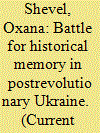

|
|
|
|
|
| Summary/Abstract |
“The fundamental dilemma in Ukraine’s decommunization process is how to undo the legal, institutional, and historical legacy of the Soviet era without repeating the Soviet approach of mandating one ‘correct’ interpretation of the past…”
|
|
|
|
|
|
|
|
|
|
|
|
|
|
|
|
| 3 |
ID:
189558
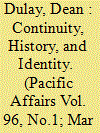

|
|
|
|
|
| Summary/Abstract |
In May of 2022, Bongbong Marcos won a commanding 59 percent of the vote to become president of the Philippines. His victory was, on some level, shocking to scholars and analysts of Philippine politics. As a result, a plethora of different theories have been proposed, in an attempt to explain why Marcos won. In this paper, we use nationally representative survey data to explore which factors predict (and do not predict) voting intention for Marcos. We find that, a) support for former President Rodrigo Duterte, b) positive perceptions of the late President Ferdinand Marcos and martial law, and c) ethnic (linguistic) identity are strong predictors of voting for Bongbong Marcos. On the other hand, age, education, and income are not. Consequently, theories based on continuity, coalition, history, and identity provide the most leverage on the question of why Bongbong Marcos won the election.
|
|
|
|
|
|
|
|
|
|
|
|
|
|
|
|
| 4 |
ID:
164220


|
|
|
|
|
| Summary/Abstract |
THE MEANING of a historical event can largely be explained by its legacy. This is the attitude of people in Lemvig and Thyboren, two small coastal towns in the northwest of the Jutland peninsula. For a century and a half, they have treasured the memory of a drama that took place on September 25, 1868, off what the local population justly calls an "iron coast."
|
|
|
|
|
|
|
|
|
|
|
|
|
|
|
|
| 5 |
ID:
152011
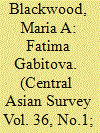

|
|
|
|
|
| Summary/Abstract |
This article examines the personal papers of Fatima Gabitova, a writer and pedagogue who fell victim to Stalinist repression as a ‘wife of an enemy of the people’ in the Kazakh SSR. Gabitova’s life was in many ways extraordinary, and many of her experiences were hardly typical. Nevertheless, her exposure to Kazakhstan’s cultural and political elites and the rich textual archive she left behind provide a highly nuanced window into the lived experience of Stalinism in Kazakhstan. Her writings, which include journals, poetry, letters and memoiristic essays, reveal a highly articulated sense of self that was informed and influenced by the realities of life under Stalinism, but was not ultimately determined by the parameters of the Soviet system. Throughout her personal writings, Gabitova exhibits a complicated ambivalence towards the reality of Soviet rule that demonstrates the broader contradictions of Stalinism as a system that was at once repressive and participatory.
|
|
|
|
|
|
|
|
|
|
|
|
|
|
|
|
| 6 |
ID:
161047
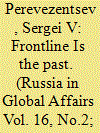

|
|
|
|
|
| Summary/Abstract |
This article studies several methods of assessing historical reality—“interpretation,” “mythologization,” “falsification,” and “folk history”—and describes all four of them. Based on this classification, the author analyzes the historical substantiation of nation-building in the modern Ukrainian state. The facts and theories used in this article convincingly prove that, unfortunately, by rejecting the data provided by Ukrainian and world science, Ukrainian politicians are building “a single Ukrainian nation” mainly by falsifying history and even using folk history. Such historical policy dramatically whips up political, ethnic, and religious tensions in the country and has negative consequences for the Ukrainian state.
|
|
|
|
|
|
|
|
|
|
|
|
|
|
|
|
| 7 |
ID:
189158
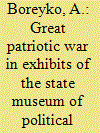

|
|
|
|
|
| Summary/Abstract |
THE GREAT PATRIOTIC WAR, which started 80 years ago, remains both a relevant and painful topic for our country. Russians' interest in those events is supported by numerous works of research and journalism, as well as projects that allow people to trace the fate of their relatives on the battlefields of that war. However, manipulations of public opinion at the global level that seek to belittle the role of our country in the victory over the Axis powers are distorting historical memory and leading to attempts to revise the outcomes of World War II.
|
|
|
|
|
|
|
|
|
|
|
|
|
|
|
|
| 8 |
ID:
100398
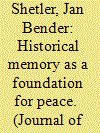

|
|
|
|
|
| Publication |
2010.
|
| Summary/Abstract |
While ethnic identity formulated by historical memory is often understood as the cause of violent conflict in Africa, this qualitative historical study of interethnic relations between Luo and Bantu-speaking communities on the borderlands of Tanzania and western Kenya demonstrates just the opposite. In fact, migration and violent conflicts over land in the late 19th century were the basis for oral traditions that established new microethnic identities. It was only in the colonial era that the modern macroethnicities of Luo and Suba (Bantu), as rigid oppositional identities, began to solidify around land disputes. Historical memory constructs these dynamic microethnic identities around interethnic reciprocal networks that were necessary for gaining security and access to land in the past. During these late 19th-century conflicts, interethnic alliances and marriages were the norm, resulting in many Bantu-speaking communities becoming Luo, to one degree or another. Historical memory, as the central tool for constructing ethnicity, can be used to promote either violence or peace, depending on how it is deployed. In western Kenya, an oppositional Luo identity resulted from the colonial construction of macroethnicity, while in North Mara, Tanzania, a different national narrative has resulted in relative peace. In his collection of oral traditions from North Mara, Zedekia Oloo Siso makes a case for these still salient microethnicities, based on regional networks that cross-cut ethnic boundaries, as the indigenous networks necessary for peace.
|
|
|
|
|
|
|
|
|
|
|
|
|
|
|
|
| 9 |
ID:
193461
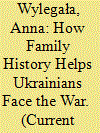

|
|
|
|
|
| Summary/Abstract |
Ukrainians displaced by the current Russian invasion frequently turn to family memories of a previous war to understand and cope with their situation. In an oral history project, Ukrainian refugees often compared Russian actions to World War II–era war crimes perpetrated in Ukraine by Nazi Germany—and many assert that the Russians today are worse. These experiences have fueled an intense hatred of the Russians, even among Russian-speakers. For these Ukrainians, the idea of the Russkii mir, or “Russian world,” binding post-Soviet countries in a common civilization, has been discredited.
|
|
|
|
|
|
|
|
|
|
|
|
|
|
|
|
| 10 |
ID:
083709


|
|
|
|
|
| Publication |
2008.
|
| Summary/Abstract |
South Korea is Japan's most logical ally in East Asia. Both nations share the same primary military benefactor, the United States. Their geographic proximity makes them natural allies in offsetting China's growing power and unknown intentions. In spite of the many reasons to ally, relations remain strained, primarily because of Japan's historical occupation of Korea. In this article, the authors examine the political issues that must be resolved for Japan and South Korea to work together and the potential for such reconciliation in light of South Korea's on-again/off-again drift away from the United States and Japan's open embrace of U.S. protection and occasional political distancing
|
|
|
|
|
|
|
|
|
|
|
|
|
|
|
|
| 11 |
ID:
109972


|
|
|
|
|
| Publication |
2011.
|
| Summary/Abstract |
This lecture addresses the connection between the production in the present of particular memories of the past and the ability to frame present-day conflicts in ways that render certain possibilities legitimate while excluding others. Through the ethnographic material I have gathered during my career I will show how different projects of the future (personal and collective) appeal to memories of conflict that link responsibilities and generations at different scales. Taking as my object of observation the transformations in economic relations in a heavy industrial region of northwestern Spain I will trace the connections between the languages and practices of contention, the reconfigured structures of production and governance, and the production of diverse memories (and silences) of conflict. Diverse memories produce struggles framed in class terms, or struggles framed in terms of corporatist interests, or in terms of contingently defined social claims. Through this often ambivalent delimitation of conflicts between past and present, the field of possible futures gets configured and with it the spectrum of possible political action.
|
|
|
|
|
|
|
|
|
|
|
|
|
|
|
|
| 12 |
ID:
189844


|
|
|
|
|
| Summary/Abstract |
The article presents arguments allowing the notion of security dilemma to
be extended to historical memory and competing narratives of the past.
In the international arena, securitization of historical narratives can lead
to a mnemonic security dilemma. Systematic challenging of the most
important historical narratives of state A by key mnemonic actors of state
B puts the political elites of state A before a choice: ignore this action
or develop a set of measures aimed at countering attempts to undermine
“their own” narrative and discredit historical narratives significant for the consolidation of society in state B. Under these conditions, the
incompatibility of narratives becomes an important and even constitutive
factor in the formation of macropolitical identity. The article considers
different options for the emergence of a mnemonic security dilemma during
conflicts between Serbia and Croatia, and between Russia and Ukraine. It
shows that a mnemonic security dilemma significantly complicates the
resolution of interstate conflicts.
|
|
|
|
|
|
|
|
|
|
|
|
|
|
|
|
| 13 |
ID:
183410


|
|
|
|
|
| Summary/Abstract |
This paper studies North Korea’s official narrative on the Second World War.
The country is extremely autocratic, meaning that the only allowed vision
is the one prescribed by the state. This vision was initially imprinted by
the Soviet Union in the late 1940s. However, the official narrative on the
Soviet-Japanese War, which led to the establishment of the North Korean
state, has been rewritten: today Pyongyang credits Japan’s defeat to Kim
Il-sung and his “Korean People’s Revolutionary Army”—an organization
which never existed in reality. This article traces the evolution of the North
Korean false narrative and concludes that each of its pages was farther away
from historical truth than the previous one.
|
|
|
|
|
|
|
|
|
|
|
|
|
|
|
|
| 14 |
ID:
163318


|
|
|
|
|
| Summary/Abstract |
Since the 1980s, Japan’s war memory has strained its relations with South Korea and China, to a less degree, the USA. Two of the thorniest issues are the comfort women and the US atomic bombing of Japan. Before the Obama administration announced its policy pivot to Asia in 2011, both Japanese and American leaders were reluctant to make amends for the past acts of their countries. However, in 2015, the Japanese conservative Prime Minister Abe reached an agreement with South Korea that “finally and irreversibly” resolved the comfort women issue, thus achieving a historic reconciliation between the two countries. In 2016, then President Obama visited Hiroshima to commemorate the atomic bomb victims. Then, in December 2016, the comfort women issue resurfaced in Japan and South Korea relations, indicating a failure of the reconciliation. Why did the USA change its policy on historical issues involving Japan? Why did Abe and the South Korean President Park Geun-hye settle the comfort women issue? Why did Obama visit Hiroshima? Why did the reconciliation fail? In this article, I propose a rational choice theory to answer these questions. Applying the proposed theory and relying on available evidence, I argue that the settlement of the comfort women issue and Obama’s visit to Hiroshima are important components of Obama’s pivot to Asia to balance China’s rise. The reconciliation failed mainly because it did not resolve the historical justice issue promoted by the human rights norms. I discuss some implications for reconciliation in Northeast Asia.
|
|
|
|
|
|
|
|
|
|
|
|
|
|
|
|
| 15 |
ID:
103723


|
|
|
|
|
| Publication |
2011.
|
| Summary/Abstract |
The major historical issue in the Israeli-Arab/Palestinian conflict is the causes for the 1948 Palestinian exodus. Among the Israelis/Jews there are two main narratives regarding this issue: the Zionist one - the refugees fled, for various reasons; and the critical one - some fled while others were expelled by the Jewish/Israeli security forces. This article explores the way the Israeli/Jewish historical memory (i.e. the Israeli/Jewish research community) related to this historical issue from 1949 until 2004. According to the findings, until 1957 this memory exclusively presented the Zionist narrative. However, from 1958 to 1976 this Zionist trend largely continued but was accompanied by considerable critical studies. Later, from 1977 to 2004, this memory was characterized by the almost exclusive adoption of the critical narrative (with major increase in its significance since 1988). These findings contradict the way the literature relates to this memory as almost exclusively Zionist until the late-1980s. Other aspects of this memory are also discussed, such as the explanations for its characteristics, the significance of non-academic scholars, the contribution of scholars who reside externally to the given country, state-research community relations, the influence of present interests on the portrayal of the past, and gender issues. The findings have theoretical implications for collective and historical memories.
|
|
|
|
|
|
|
|
|
|
|
|
|
|
|
|
| 16 |
ID:
139807
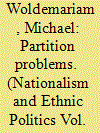

|
|
|
|
|
| Summary/Abstract |
Under what circumstances does partition yield war between resulting successor states? This article probes the causes of the Eritrean-Ethiopian War (1998–2000) in an effort to offer tentative answers. The evidence suggests that in this particular case, the causes of postpartition war reflected a more general cause of war: disagreements over relative power. These disagreements were underpinned by the divergent historical memories maintained by ruling elites in each country about the joint revolution that brought them to power and partitioned the Ethiopian state. Based on a wide array of materials, this article contributes to debates on the comparative study of partition, while providing new insight into the origins of the Eritrean-Ethiopian War.
|
|
|
|
|
|
|
|
|
|
|
|
|
|
|
|
| 17 |
ID:
080900


|
|
|
|
|
| Publication |
2008.
|
| Summary/Abstract |
This article examines Russia's response to the 1999 Kosovo crisis in order to evaluate theoretical propositions about the relationship between historical memory and conflict-causing misperceptions. For decades, Russian society consumed, especially through mass education, a particular interpretation of Russia's imperial wars and interventions in the Balkans and its historical relations with Serbia and the West. A comparison of the content of this view to the Russian elite and popular response to the 1999 Kosovo crisis shows how particularly pernicious historical ideas influenced a number of serious misperceptions about Balkan realities and Western motives in 1999. The case reveals that historical memory is more far-reaching than accounted for by traditional theories of misperception. Those theories, when they do incorporate historical memory, ignore or minimize the role of popular historical ideas as independent causes of misperceptions; perceptual distortions result largely from cognitive limitations in the processing of information, hence little can be done to avoid them. This study shows how historical ideas themselves may be a source of misperceptions. This has important policy implications: since historical beliefs are hardly immutable, efforts taken to scrutinize and challenge particularly pernicious interpretations of the past could help avoid conflict-causing perceptual distortions
|
|
|
|
|
|
|
|
|
|
|
|
|
|
|
|
| 18 |
ID:
184016


|
|
|
|
|
| Summary/Abstract |
IN THE 21st century, the politics of memory is becoming even more relevant as a tool of international relations. This is amply confirmed by Japan, where the past traditionally serves as a tool for legitimizing the political and social order and largely shapes foreign policy principles. But this past contains many dark chapters that stir up conflicts with its neighbors. Many of them are rooted in the distant past, when Japan aggressively spread its influence in Asia. Japanese expansion caused thousands of deaths.
|
|
|
|
|
|
|
|
|
|
|
|
|
|
|
|
| 19 |
ID:
149540


|
|
|
|
|
| Summary/Abstract |
Since the early 2000s, “soft power” has become one of the most popular analytical tools in International Relations scholarship devoted to analyzing the influence of states in the international arena. Although scholars of Russian foreign policy have also embraced the notion of “soft power”, they have mainly limited the scope of their analysis to Western countries and the former Soviet republics. In contrast, this article focuses on Laos, Vietnam and Thailand, countries whose history of relations with Russia are fundamentally different from both the West and Russia’s “near abroad”. By analyzing the images of Russia and its soft power resources in these countries, this article seeks to create a more comprehensive understanding of the ways contemporary Russia is perceived in the world and its potential tools of influence in Southeast Asia. Drawing on the results of a survey conducted among university students, this article examines the ways young educated elites in the three countries perceive Russia. It also explores the degree of correspondence between these images and the self-image of Russia espoused by its political elites. The results of this study suggest that while overall Russia is perceived as a Great Power, and its role in the world is seen as mostly positive, there are also important dissonances between the two images. Based on discernible differences among the three groups of respondents in the ways they perceive Russia, the article also suggests that historical memory plays an important role in shaping these perceptions.
|
|
|
|
|
|
|
|
|
|
|
|
|
|
|
|
| 20 |
ID:
164257


|
|
|
|
|
| Summary/Abstract |
This article examines the behavior of Poland on the international stage, specifically its interaction with the European Union, the United States, and Russia in a historical context using a psychoanalytic approach to memory studies. The author presumes that Polish foreign policy may be dominated by “strategic thanatos”—a historical practice of tactically meaningful but strategically destructive behavior which, while declaring the state’s sovereignty a supreme value, in the long run reduces the level of national security and increases international political tensions around Poland. The author suggests that Poland’s policy of building “privileged” relations with the United States and its activity in the post-Soviet space is a continuation of Poland’s interwar policy, whose historical implications have not been critically reconsidered by Polish political and intellectual elites. This policy has resulted in an objective deterioration of the strategic position of modern Poland. The author predicts that, amid a growing conflict with the European Commission, the ruling anti-liberal national clericals from the Law and Justice party will try to rely on U.S. support and become a center of gravity for European rightwing populists. The proposals of French President Emmanuel Macron to deepen European integration and build a new European security architecture together with Russia suggest that the European establishment is seeking to reduce the EU’s military
|
|
|
|
|
|
|
|
|
|
|
|
|
|
|
|
|
|
|
|
|